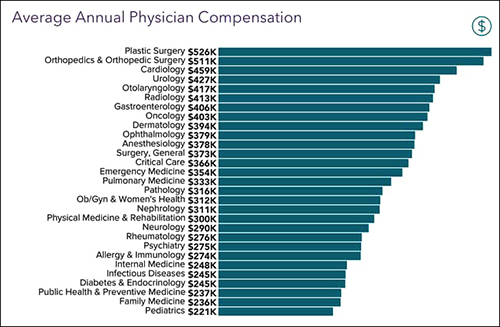Medscape Report on Physician Salaries in 2020 Shows Pathologists at Middle in Pay, but Near Top in Job Satisfaction
Though pathology salaries rank 16th among 29 medical specialties, it is in the top 10 among specialties that attract women and respondents say that comes with a lot of paperwork
Despite “hardships” brought on by the COVID-19 pandemic, 18,000 physicians in more than 29 medical specialties who participated in Medscape’s 2021 Physician Compensation Report said that, overall, their 2020 income was similar to prior years. Pathologists reported earnings in 2020 of $316,000, $28,000 below the average specialist’s salary of $344,000.
The average pathologist’s salary ranked 16th among medical specialty salaries.
Compared to 2019, medical specialists on average made $2,000 less in 2020. The average salary for primary care doctors was $242,000 in 2020, down $1,000 from 2019, according to a Medscape news release.
“Physicians experienced a challenging year on numerous fronts, including weathering the volatile financial impact of lockdowns,” said Leslie Kane, Senior Director, Medscape Business of Medicine, in the news release. “Our report shows that many were able to pivot to use telemedicine and focus on tactics that would protect their practices.”
Medscape, a health information provider that is part of the WebMD network, said that in addition to telehealth, doctors turned to MACRA (Medicare Access and CHIP Reauthorization Act of 2015) value-based payment reward programs and other strategies to minimize the effects of office closures last year.

Pathology Salary Unchanged
To complete its study, Medscape asked physicians to take a 10-minute online survey. The reported findings included responses from 17,903 physicians (61% male, 36% female) practicing in more than 29 specialties between October 2020 and February 2021.
Pathologists who participated in the survey reported no change in their annual salary since 2019. Other specialties that reported no salary change include:
- Family medicine,
- Infectious diseases,
- Ophthalmology, and
- Orthopedics/orthopedic surgery.
Top 10 Medical Specialty Salaries
Medscape’s report listed these top-10 medical specialties as earning the highest salaries (see the graphic below for the full list of medical specialties surveyed):
- Plastic surgery: $526,000
- Orthopedics/orthopedics surgery: $511,000
- Cardiology: $459,000
- Urology: $427,000
- Otolaryngology: $417,000
- Radiology: $413,000
- Gastroenterology: $406,000
- Oncology: $403,000
- Dermatology: $394,000
- Ophthalmology: $379,000
Specialist Salary Increases and Decreases
Contrary to what many specialists reported, plastic surgeons did not experience slowdowns in appointments during the COVID-19 pandemic. In fact, not only did plastic surgeons earn the most, at 10% they are the medical specialists who got the biggest increase in pay of previous years as well.
According to the American Academy of Facial Plastic and Reconstructive Surgery (AAFPRS), which conducted its own salary survey of its member surgeons, “70% of AAFPRS surgeons report an increase in bookings and treatments over the course of the COVID-19 pandemic, with nine in 10 facial plastic surgeons indicating an increase of more than 10%. Surgical procedures are the most common procedures as part of this upsurge, perhaps cancelling out any decreases that might have resulted from the economic crisis and lockdowns.”
Other specialist salaries which Medscape found increased in 2020 include:
- Oncology: up 7%
- Rheumatology and cardiology: up 5%
- Diabetes/endocrinology: up 4%
- Neurology, critical care, psychiatry: up 3%
- General surgery, urology, public health/preventive medicine: up 2%
Medical specialties that reported reductions in salary included:
- Otolaryngology and allergy/immunology: down 9%
- Pediatrics and anesthesiology: down 5%
- Dermatology: down 4%
- Pulmonary medicine, physical medicine, gastroenterology, and radiology: down 3%
- Emergency medicine and internal medicine: down 1%
About 92% of physicians surveyed indicated that the COVID-19 pandemic caused their income to decline. Also, 22% of doctors noted they experienced loss of work hours.
Pathologists Received Low Average Bonuses
Reporting on receipt of incentive bonuses, Medscape ranked pathology in the bottom half of its list with $42,000 as an average bonus. The top incentive bonuses went to those practicing:
- Orthopedics/orthopedics surgery: $116,000
- Ophthalmology: $87,000
- Otolaryngology: $72,000
About 59% of primary care physicians and 55% of specialists surveyed reported receiving an incentive bonus.
Pathologists Rank High in Job Satisfaction
In responding to a question about compensation, pathologists ranked near the top (seventh position) with 64% saying they are content with their pay. Others expressing salary satisfaction included:
- Oncology: 79%
- Psychiatry: 69%
- Plastic surgery: 68%
- Dermatology: 67%
- Public health/preventive medicine: 66%
- Radiology: 65%
- Pathology: 64%
Pathology Popular Among Women MDs
Medscape found that women MDs chose certain medical specialties more often than others, including pathology, which ranked eighth. The top eight specialties employing female physicians are:
- Pediatrics: 61%
- Obstetrics/gynecology: 59%
- Diabetes/endocrinology: 50%
- Family medicine: 47%
- Dermatology: 46%
- Infectious diseases: 46%
- Internal medicine: 44%
- Pathology: 43%
Specialties with the fewest female physicians are:
- Plastic and general surgery: 20%
- Cardiology: 14%
- Urology: 11%
- Orthopedics/orthopedics surgery: 9%
Pathology a Leader in Paperwork
Medscape also surveyed physicians as to the estimated hours they spend per week on paperwork and administration. Here, pathology ranked the fifth highest with 19%, while radiologists and hospital-based physicians were third from the bottom with 11.6%.
Specialists that reported the highest hours spent on paperwork include:
- Infectious diseases: 24%
- Public health/preventive medicine: 20.7%
- Nephrology: 19.8%
- Internal medicine: 19.7%
- Pathology: 19%
If They Could Do It Again, Most Would
Amid a trying year, the Medscape survey respondents made an encouraging point: 78% of them said they would choose medicine as a career again. And 85% of pathologists said they would choose the same specialty.
Medscape’s report may be helpful to hospital-based clinical laboratory leaders preparing salary budgets and to pathologists in salary negotiations and determining professional responsibilities.
—Donna Marie Pocius
Related Information:
Medscape Physician Compensation Report: The Recovery Begins 2021
Medscape Physician Compensation Report Shows Salaries Held Steady Despite Pandemic
A Pandemic of Dysmorphia: “Zooming” into the Perception of Our Appearance
AAFPRS Announces annual Survey Results, A Look at How COVID-19 Disrupted Facial Plastic Surgery




